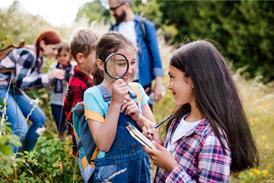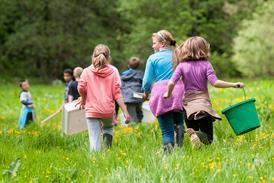We look at the concept of Wild Beach and how it can inform learning outside the classroom practice in schools that are miles away from the seaside.
 M.jpg)
Sussex Wildlife Trust (SWT) has been running Wild Beach sessions with schools since 2004, and has been offering Continuing Professional Development (CPD) sessions in the concept since 2008.
Originally established by the SWT as a way of getting the next generation to be more connected with the coast, Wild Beach sessions have since had a huge impact on the educations of scores of pupils across the south coast.
What is Wild Beach?
“Wild Beach draws upon the Forest Schools approach,” explains Mike Murphy, education development officer at Sussex Wildlife Trust. “It’s about ensuring children have regular visits to an outdoor place so that they build a connection with that place.
“The idea is that they go back again and again. Each time, the weather might be different, there may be different clouds, or in the case of the beach, the tide might be different. When children keep going back to a place and see it in all its different states, they start to build a bond with that place.”
Every Wild Beach session differs. In the case of St Mary Magdalen Primary School in Brighton, the Wild Beach programme involved taking pupils outside the classroom once a week.
Most trips took the pupils to the beach at Brighton. But one session saw them cycle to Shoreham Harbour to meet the fishermen there.
In the beach-based sessions, pupils were shown the area within which they were permitted tp explore. Within that space a number of activities were started, and children could decide which ones they wanted to participate in.
“We run all sorts of different activities at the same time,” said Mike. “So a few teachers would be leading a paddling session by the sea, for example. On another side of the area we’d put tarps down so pupils could try shelter building. On another side children were picking through the strand line (the line of debris left behind by high tide).”
On the day at Shoreham Harbour, pupils got to talk to the local fishermen. They saw the tanks where live lobsters were kept and got the chance to handle them. Then they popped into the harbour fish shop to look at different varieties of fish.
Curriculum links
To the untrained eye, the activities involved in Wild Beach don’t look intrinsically curriculum linked. Pupils on the beach look like they are having fun. However, the sessions are acutely cross curricular.
Data collected on the beach on topics like cloud cover and wave direction can be used in numeracy classes back in the classroom.
Creative writing classes can be developed that encourage pupils to write about the beach.
Pupils from St Mary Magdalen School also conducted research on the objects and animals they had found on the beach, and were encouraged to develop their own scientific questions about these items ahead of their next Wild Beach session.
“Children were leading their own learning,” explains Mike. “This technique encourages them to come up with their own questions. In my experience they can’t wait to ask their questions when they come to the next Wild Beach session.”
So what can be learnt from Wild Beach?
In many schools, teachers and educational visit coordinators have to jump through hoops to justify school trips.
The visits have to do exactly what they say on the tin as far as curriculum links are concerned. Subject links have to be overt.
However, Wild Beach demonstrates that visits that let children explore by themselves, in a place they have learnt to be happy and free in, can lead to some impressive results.
“The teacher from the Brighton school said her children had done some of the best creative writing after the Wild Beach sessions,” explains Mike. “I also often find that children start to develop relationships with pupils they would not have worked with before.
“When Wild Beach sessions are followed up by curriculum based sessions in the classroom afterwards, they can lead to great outcomes.”
For more information about Wild Beach visit www.sussexwildlifetrust.org.uk.









